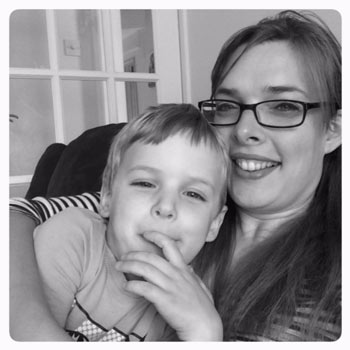|
|
Allergies and anxiety – a parent's persepective Nathalie Newman's small son, Callum, has multiple anaphylactic allergies. How do they cope with inevitable anxiety that living with this condition brings? |

What does it mean to be anxious? Anxiety by definition is a feeling of worry, fear and unease that can be mild or severe. It’s a normal part of life, all-be-it something that affects people in different ways. It’s what we feel when we become tense, worried and even afraid, especially about things that could happen, and it’s a natural human response when we feel under threat. As anyone in the allergy world will tell you, anxiety and allergies come hand in hand. Whether we’re looking at it from a parent or a child perspective, it stands to reason that anxiety will play a huge part in daily life. I’ve been an allergy parent for six years now, and whilst I openly advocate positivity to everyone I work with, be it parents, children, health care professionals and clients within the food industry, it would be dishonest of me to say I didn’t still suffer from anxiety from time to time. Allergies change your whole perspective of daily life, and it’s true when they say that life as you know it changes when an allergy diagnosis is made. You have to learn to adapt and change the way you do many things, to understand when you should talk about your allergies and when you should keep quiet, to learn about cross contamination and all the implications it brings. Anxiety is almost always with you in the early days, as you learn what triggers reactions, worrying constantly about when the next reaction might occur and how you will deal with it if and when it does happen. When your allergic child is small, they are constantly in your care. You are able to protect them, look after them, pre-empt anything happening. However, when they get bigger, and start school, all this changes. Suddenly their care is the responsibility of someone else, and you have to learn to trust that they will be able to look after your precious child as well as you. This is something that can be very hard to get your head round, and it is where most parents will admit to anxiety, as they struggle to learn to not be fully in control and trust someone else to take the reins. Being an allergy parent is like learning to live with a ticking time bomb. You can teach your children how to remain safe, make them understand their allergies and what to stay clear of, and know about the medication that will help them. But, you always have the worry of another reaction being just around the corner. You never know when it will happen, so you always have to be prepared. Managing anxiety – especially in the child The anxiety from this has to be pushed to one side, otherwise you would never be able to do anything as your fear would take over. It’s something that is part of your every day life, we’re all just very good at hiding it! They also have to deal with their own anxiety, which is why it’s even more important that as a parent you don’t show any of your concerns or worries. If they pick up on it, then it will only make them feel worse. Our job is to fill them with confidence, be their support and let them explore the world in as safe a way as possible! Children with allergies will have regular consultant appointments to check how they’re doing, review medication and treatment and see if anything has changed through skin prick tests, blood tests and so on. But one thing that is rarely touched on is the mental side of their wellbeing. Children will often feel bewildered at what has happened to them. Certainly from Callum’s perspective, there has often been a quiet muttering of ‘why me?’ or ‘why has this happened again?’ or even the simple ‘I don’t like it!’. It’s hard for children to put into words exactly what has happened to them, especially if they have gone through a severe allergic reaction that has resutled in an anaphylactic response. Adults who have had an anaphylactic reaction describe the sensation as like a black cloth that coming over their face, smothering them and leaving them struggling to breathe. Whilst at the same time they feel as if they are cooking, their heart racing, and a real sense of absolute fear that they’re not going to make it. But an adult that is able to articulate this – and even so it makes for difficult reading. Children do not have the ability to vocalise what they have experienced in the same way, and it often manifests itself in other ways, primarily as anxiety. This can result in clinging to parents as a safety mechanism or often becoming subdued as they try to come to terms with what’s happened. Callum certainly behaves in an aggressive manner as he tries to work his way through what has happened with a reaction. He goes through a 3-day cycle, where he is aggressive, then very subdued before finally extreme exhaustion. It then takes him a several weeks to fully recover. As he has become older, he is better equipped to vocalise how he feels, but he really struggled when younger, and I think it’s fair to say that anxiety is often missed in young children. So it would be wonderful to see more mental health support for those with allergies. June 2018 See here for details of the psychology service now offered to allergic children at Guy's and St Thomas' Hospital in London - and here for many more articles on the emotional effects of allergy. |












